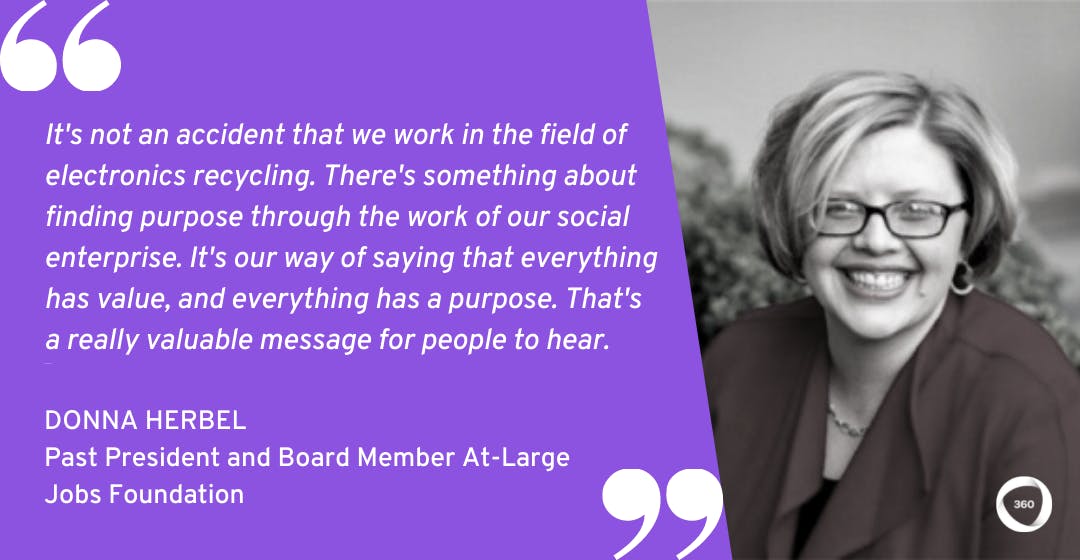As L&D leaders, we get a new chance every day to make a meaningful difference in the lives of our learners. Whether through designing just the right course or giving someone the encouragement they need to grow and thrive, we can make a positive impact.
That’s why it was so inspiring for me to chat with Donna Herbel, Past President and Board Member At-Large of the Jobs Foundation, a group overseeing social enterprise work to support previously incarcerated people to develop skills in electronics recycling.
Donna is an experienced L&D leader, and to get our discussion rolling, she told me about her incredibly rich and varied career so far.
Psst: We’re launching the CLO Connect community! Don’t miss out–join our waitlist now.
A deep and varied career in learning
Like a lot of L&D leaders, Donna has had a deep and varied career in a range of industries. “My L&D background comes through the restaurant and hospitality industry. I’ve worked in a variety of training and support roles, and I currently lead L&D for Ascent Hospitality Management.”
“On the restaurant side, I provide systems, tools and processes, hourly training, leadership training, and bench development infrastructure for an organization that supports a little over 600 franchise and corporate-owned restaurants in the United States and Canada.”
“Secondarily to that, I’m also a proud member and Past President of the Council of Hotel and Restaurant Trainers, which is an international organization that supports upskilling and development for training professionals for multi-unit organizations.”
“Then there’s my work with the Jobs Foundation, where I’ve been able to experience the gift of board service. I’ve found a way to meet the needs of my heart while also being able to apply my skills to lead our training and development committee.”
And as Donna explains, following her heart has meant facing one big challenge: helping people overcome the barriers to employment associated with incarceration.
Need a few more CLO Connect expert insights? Find out How L&D Can Help Your Company Scale
I’ve found a way to meet the needs of my heart while also being able to apply my skills to lead our training and development committee.
Helping previously incarcerated people get back on track
As Donna explains, the Jobs Foundation plays a key role in helping previously incarcerated people bring more stability into their lives. “The Jobs Foundation is the non-profit that oversees the work of a facility called Tech Dump. It’s a social enterprise aimed at helping individuals overcome barriers to employment.”
“We work with individuals who, through a variety of events, have wound up behind bars,” says Donna. “We help with the post-incarceration transition into the community, working back into job skills and life skills in a world that may have changed while an individual was incarcerated and not getting the same experiences.”
For Donna and her Jobs Foundation team, the goal is clear. “How can we help individuals post-incarceration to reclaim their ability to earn, be self-sufficient, provide for themselves and their families, and become contributing and engaged members of our communities and our society? That’s the big challenge we’re looking to solve.”
One key way Donna and her team meet this challenge? Supporting learners to develop transferable long-term capabilities.
We help with the post-incarceration transition into the community, working back into job skills and life skills.
1. Supporting learners to develop transferable long-term capabilities
“To help our learners, we’ve created a technology recycling facility called Tech Dump. It’s a paid training program. Individuals are referred to us, and we provide the technical training they need to get started.”
“It might be the basics with sorting electronics, or how to do a teardown and separate different items into parts for recycling. We also offer forklift operator certifications.”
For Donna, this training helps learners to develop transferable skills. “We’ve worked to lay out a competency map of skills training that are transferable out of Tech Dump into general work. Our larger goal is to provide people with the technical training and the work experience that can act as risk mitigation for their future employers.”
“This is how we can assist people with the transition into higher-wage jobs. That way, we can support people to sustain themselves with food, housing, and childcare.”
But the Jobs Foundation is also helping people to develop wider ‘life skills’, too.
2. Helping people develop their ‘life skills’
“We also do some work with ‘life skills’. This can include things like how to advocate for yourself with a landlord or buy a car. We’ve even helped people get a driver’s license if they haven’t had one for the last ten years.”
“We’re trying to help individuals to provide a demonstrable work history, which can be a big challenge. It’s tough for some people to re-engage with a world that may have changed considerably during their incarceration.”
As Donna explains, the Job Foundation’s work involves grappling with some weighty issues. “There’s a lot of overlap between incarceration and mental illness, learning disabilities, and homelessness. So, we’re working to use training and development to help people to make the transition they want to make.”
This is what I find so inspiring about stories like Donna’s. People are using their backgrounds in L&D to craft programs that help individuals in need to build key technical and life skills.
One other key part of Donna’s work? Building a credible training experience with peer learning.
It’s tough for some people to re-engage with a world that may have changed considerably during their incarceration.
Offering a credible and authentic experience with peer learning
“Our learning program starts with being humble enough to know we’re not the experts in everything,” says Donna. “There are places where we do have this expertise, such as the sorting or tearing-down of electronics.”
“Of course, we also have what most L&D experts would recognize as traditional learning methods, such as push content like demos, posters, or on-the-job skills training. In addition, we also have a professional on-site work and development coach working with people individually on the challenges they’re experiencing, and how we can help with their personal growth.”
As she explains, the Jobs Foundation needs to offer relatable learning to succeed. “We can’t pretend we’re the smartest people in the room. It just doesn’t resonate, and it doesn’t provide the outcomes people will act on or internalize. We need to acknowledge that we haven’t had the life experiences our learners have had.”
“That’s why we do a lot of work with peer mentorship, where we have individuals who have gone through our training program before, and who are then employed as staff. They become the direct coaches for functional area supervision, offering one-on-one coaching and development. We’ve had a lot of success here through building an authentic learner experience.”
So, what impact has the Jobs Foundation made so far?
We need to acknowledge that we haven’t had the life experiences our learners have had.
‘Lives reclaimed’–how the Jobs Foundation tracks its impact
“We really look at the overall success of our programs in terms of what we call ‘lives reclaimed’,” says Donna. “It’s not an accident that we work in the field of electronics recycling. There’s something about finding purpose through the work of our social enterprise. It’s our way of saying that everything has value, and everything has a purpose. There’s no such thing as throwaway junk. That’s a really valuable message for people to hear.”

Beyond the success of this message, the Jobs Foundation is also making a positive financial impact. “In terms of the financial impact, a dollar invested in our organization yields a total of seven dollars back, in terms of being able to take items out of landfills on the technical side.”
“On the people side, we measure our phase one graduation rate, and our phase two graduation rate. Once people have graduated out of those phases and completed the program, we measure how often they are placed in jobs, working successfully, and aren’t re-offending. We know a lot of re-offending rates are tied to economic challenges. It’s all about the ability to earn.”
Of course, like a lot of organizations, COVID-19 has presented some new challenges for the Jobs Foundation. “Our trainee numbers vary year to year, and it’s been a really interesting year for talent management in the age of COVID-19.”
“We’ve found that we’re able to help our phase one graduates get into job placements. We’ve had trainees stretching and completing the program in even less than nine months recently. We’re doing really well in terms of recidivism rates and lack of re-offending rates. That’s how we know we’re making such a big difference.”
Thanks again to Donna for taking the time to share her inspiring story!
If you’re looking for more great stories about transformative L&D, take a look at our interviews with Ryan Giordano of Gong on supporting ambitious people to develop their careers, and with Ta Lynn Mitchell of Code Nation on helping volunteer teachers make a big impact.
Want more peer insights on transforming workplace learning? Join the waitlist for our CLO Connect community, and check out our other #CLOConnect interviews with top L&D leaders on driving growth and scaling culture through Collaborative Learning. Or you can subscribe (below 👇) to our weekly newsletter to receive our latest posts directly in your inbox.



